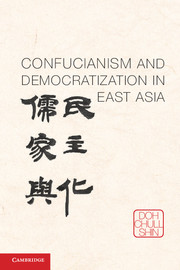Book contents
- Frontmatter
- Contents
- Acknowledgments
- Introduction
- Part i Confucianism and Confucian East Asia
- 1 The Evolution of Confucian East Asia and Its Cultural Legacies
- 2 The Confucian Asian Values Thesis
- Part ii Upholding Confucian Legacies
- Part iii Engaging in Civic Life
- Part iv Embracing Democracy
- Part v Final Thoughts
- References
- Index
2 - The Confucian Asian Values Thesis
Theoretical Debate and Empirical Research
from Part i - Confucianism and Confucian East Asia
Published online by Cambridge University Press: 05 June 2012
- Frontmatter
- Contents
- Acknowledgments
- Introduction
- Part i Confucianism and Confucian East Asia
- 1 The Evolution of Confucian East Asia and Its Cultural Legacies
- 2 The Confucian Asian Values Thesis
- Part ii Upholding Confucian Legacies
- Part iii Engaging in Civic Life
- Part iv Embracing Democracy
- Part v Final Thoughts
- References
- Index
Summary
More than three decades have passed since the third wave of democratization began spreading from Southern Europe to all other regions of the world in the mid-1970s. In the wake of this wave, most or all of the countries in East, Central, and Southern Europe and in Latin America have been transformed into democracies (Diamond 2011; Haerpfer et al. 2009). In historically Confucian East Asia, where the institutional, cognitive, and behavioral legacies of Confucianism are prevalent, however, the same wave produced only two new democracies – South Korea (Korea hereafter) and Taiwan – and failed to democratize four other nondemocracies: China, North Korea, Singapore, and Vietnam. Moreover, of the two nascent democracies, Taiwan remains a “flawed” democracy even after more than two decades of democratic rule (Economist Intelligence Unit 2010), and Korea has recently moved backward from “free” to “partly free” in press freedom rankings (Freedom House 2011).
Despite all the unprecedented achievements in socioeconomic development and globalization in the region over the past three decades, Confucian East Asia today remains one of the few regions in the world in which nondemocracies prevail over democracies. To explain a lack of democratic development in the region, many scholars and political leaders have promoted Confucian values as Asian values (Tamaki 2007) and have vigorously debated their influence on the democratic transformation of authoritarian regimes in the East Asia region from a variety of disciplinary and ideological perspectives.
- Type
- Chapter
- Information
- Confucianism and Democratization in East Asia , pp. 53 - 70Publisher: Cambridge University PressPrint publication year: 2011

